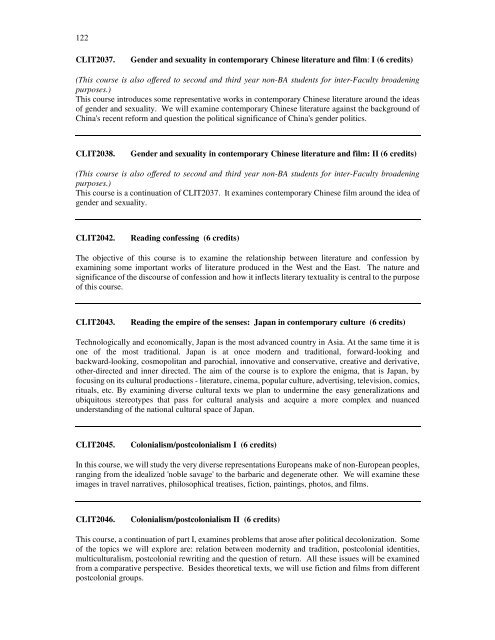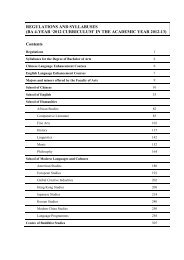Bachelor of Arts (BA) - The University of Hong Kong
Bachelor of Arts (BA) - The University of Hong Kong
Bachelor of Arts (BA) - The University of Hong Kong
Create successful ePaper yourself
Turn your PDF publications into a flip-book with our unique Google optimized e-Paper software.
122CLIT2037.Gender and sexuality in contemporary Chinese literature and film: I (6 credits)(This course is also <strong>of</strong>fered to second and third year non-<strong>BA</strong> students for inter-Faculty broadeningpurposes.)This course introduces some representative works in contemporary Chinese literature around the ideas<strong>of</strong> gender and sexuality. We will examine contemporary Chinese literature against the background <strong>of</strong>China's recent reform and question the political significance <strong>of</strong> China's gender politics.CLIT2038.Gender and sexuality in contemporary Chinese literature and film: II (6 credits)(This course is also <strong>of</strong>fered to second and third year non-<strong>BA</strong> students for inter-Faculty broadeningpurposes.)This course is a continuation <strong>of</strong> CLIT2037. It examines contemporary Chinese film around the idea <strong>of</strong>gender and sexuality.CLIT2042.Reading confessing (6 credits)<strong>The</strong> objective <strong>of</strong> this course is to examine the relationship between literature and confession byexamining some important works <strong>of</strong> literature produced in the West and the East. <strong>The</strong> nature andsignificance <strong>of</strong> the discourse <strong>of</strong> confession and how it inflects literary textuality is central to the purpose<strong>of</strong> this course.CLIT2043.Reading the empire <strong>of</strong> the senses: Japan in contemporary culture (6 credits)Technologically and economically, Japan is the most advanced country in Asia. At the same time it isone <strong>of</strong> the most traditional. Japan is at once modern and traditional, forward-looking andbackward-looking, cosmopolitan and parochial, innovative and conservative, creative and derivative,other-directed and inner directed. <strong>The</strong> aim <strong>of</strong> the course is to explore the enigma, that is Japan, byfocusing on its cultural productions - literature, cinema, popular culture, advertising, television, comics,rituals, etc. By examining diverse cultural texts we plan to undermine the easy generalizations andubiquitous stereotypes that pass for cultural analysis and acquire a more complex and nuancedunderstanding <strong>of</strong> the national cultural space <strong>of</strong> Japan.CLIT2045.Colonialism/postcolonialism I (6 credits)In this course, we will study the very diverse representations Europeans make <strong>of</strong> non-European peoples,ranging from the idealized 'noble savage' to the barbaric and degenerate other. We will examine theseimages in travel narratives, philosophical treatises, fiction, paintings, photos, and films.CLIT2046.Colonialism/postcolonialism II (6 credits)This course, a continuation <strong>of</strong> part I, examines problems that arose after political decolonization. Some<strong>of</strong> the topics we will explore are: relation between modernity and tradition, postcolonial identities,multiculturalism, postcolonial rewriting and the question <strong>of</strong> return. All these issues will be examinedfrom a comparative perspective. Besides theoretical texts, we will use fiction and films from differentpostcolonial groups.
















